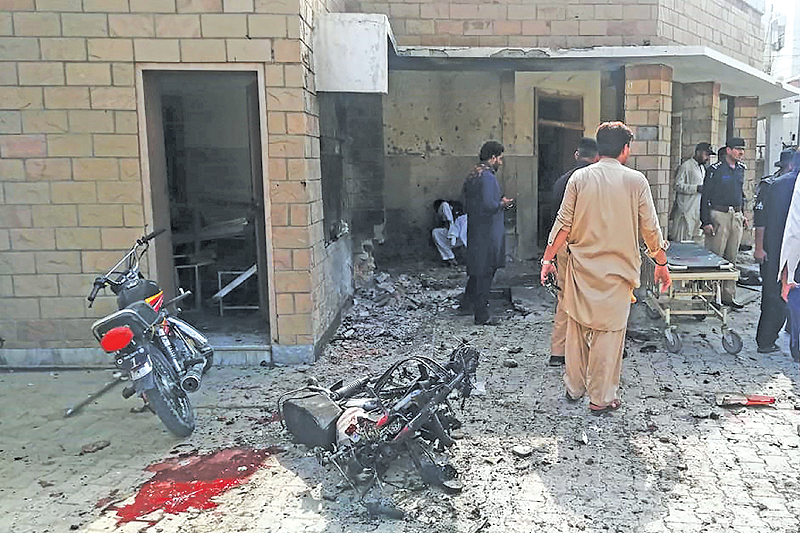Pakistan to reform madrassa, tackles hate speech and extremism
DERA ISMAIL KHAN: A female suicide bomber in northwestern Pakistan killed at least eight people and wounded 26 more in an attack outside a local civilian hospital yesterday, local officials said. The attack in Dera Ismail Khan early yesterday was claimed by Tehrik-e-Taleban Pakistan, often known as the Pakistani Taleban, which is separate from the insurgent movement across the border in Afghanistan.
Local officials said the attack happened after two police were killed at a roadside checkpoint outside the city. "When their bodies were taken to the main hospital, a suicide bomber, believed to be a female, wearing a burqa, triggered an explosive-laden jacket and caused huge losses," said Waqar Ahmad, a local police officer. He said the blast had damaged the emergency ward of the hospital and forced some of the wounded to be transferred to other cities.
Muhammed Khurasani, a spokesman for the TTP, claimed responsibility for the attack, which he said was carried out in revenge for the killing of two Taleban commanders by counter terrorism police around a month ago. However he denied the bomber was female. Dera Ismail Khan has seen a number of suicide attacks over the past decade as the Pakistani military carried out a campaign to suppress militant attacks in the area, an important hub in the $60 billion China Pakistan Economic Corridor.

Religious school reform
In another development, Pakistan said it has agreed with the country's clergy to introduce reforms in madrassa religious schools to bring them in line with conventional schools, curbing hate speech and extremist narratives. The announcement came just before Prime Minister Imran Khan's visit to Washington for a Monday meeting with President Donald Trump, whose administration continues to press Pakistan over terrorist financing and curbing militancy.
The government will register more than 30,000 madrassas, which will teach subjects like English, mathematics and science, Federal Minister for Education and Professional Training Shafqat Mehmood said. He said the government will conduct their exams and is aiming for a first batch next June, although that is not a firm goal. Pakistan's madrassas have long been accused of promoting extremist narratives and have been dubbed "nurseries of extremism".
"There will be no preaching of hate speech against any religion or sect," the minister said. "We will look at their curriculum to see there is no hatred against any sect or faith," he added. Pakistan pledged to crack down on religious seminaries suspected of fostering extremism following a school massacre by the Taleban in December 2014 that left more than 130 children dead, but the move faces stiff resistance from conservatives.
Madrassa reforms attempted by the past governments have failed due to pressure from the clergy. Pakistan is a deeply religious Muslim-majority society and, despite misgivings about madrassas, clergy are generally well respected. In another move ahead of Khan's US trip, Pakistan on Wednesday detained Hafiz Saeed, the alleged mastermind of an attack on the Indian city of Mumbai in 2008 that killed more than 160 people.- Agencies









